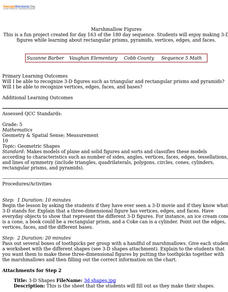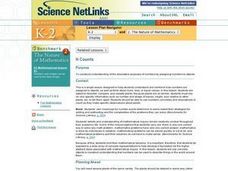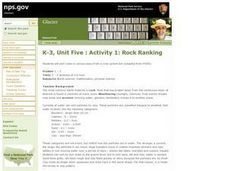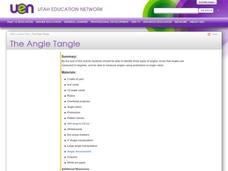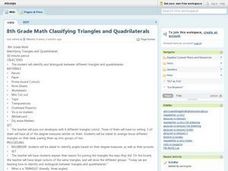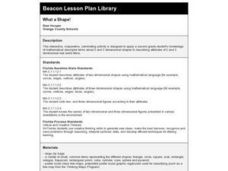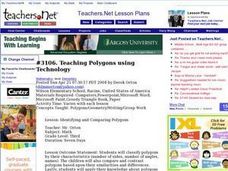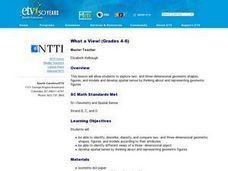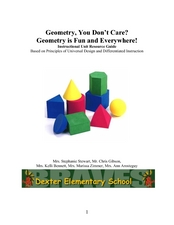Ohio Department of Education
Describing and Creating Plane Figures - Grade One
Young mathematicians draw, create, and describe different shapes using triangles. They discuss attributes of the original and created shapes. Pupils classify the created shapes and draw and write in mathematics journals to communicate...
Hawaiʻi State Department of Education
Angles on Kandinsky
Not only is Wassily Kandinsky fun to say, his art contains tons of angles. Learners discuss Kandinsky's music-inspired abstract art and four types of angles. They search one of his paintings for obtuse, right, straight, and acute angles,...
Curated OER
Marshmallow Figures
Students enjoy making 3-D figures while learning about rectangular prisms, pyramids, vertices, edges, and faces. After a lecture/demo, students use marshmallows, toothpicks and a worksheet imbedded in this lesson to create 3 dimensional...
Curated OER
It Counts
Young scholars classify and compare plants using specific information, observations, and numbers. In this mathematical inquiry lesson, students use plant characteristics to describe, compare, and classify them. They attempt to develop a...
National Park Service
Rock Ranking
Junior geologists sort rocks and soil. They separate a sample of river gravel by size, shape, color, and other characteristics. To include Common Core standards, you could have little ones graph the number of particles in each sample.
Curated OER
Angles
Fourth and fifth graders investigate angles and name them according to the criteria for obtuse, acute, and right angles. They examine a human-made yarn pattern on the floor of their classroom and identify angles, vertices, and types of...
Curated OER
Classify Prisms
Students classify prisms according to their attributes. In this classifying prisms lesson, students explore different prisms. Students generate observations of the attributes and classify the prism correctly.
Curated OER
Shape Detectives
Students become "shape detectives" as they identify, name, create and describe common shapes within pictures and objects found within the learning environment. Suggestions include incorporating shapes into all learning areas and daily...
Curated OER
Geo Jammin' - Day 2, Lesson 4: Sing a Song of Shapes
Students learn five songs to define and develop understanding of the attributes of two- and three-dimensional figures and the meaning of mathematical terms. They classify objects as either two- or three-dimensional, through the use of...
Curated OER
8th Grade Math Classifying Triangles and Quadrilaterals
Eighth graders engage in a lesson that is about classifying polygons with the focus being upon specific triangles and quadrilaterals. They conduct activities using cutouts for kinesthetic learners to help make connections while...
Curated OER
Shoeless Math
First graders sort and classify, and complete a T-chart using Students' shoes.
Curated OER
What a Shape!
Second graders culminate their study of shapes by describing the shapes using the proper mathematical descriptors.
Curated OER
Classifying Transformations
Students analyze different polygons by shapes and sides. In this geometry lesson plan, students differentiate between similar and congruent polygons. They name the different polygons based on the number of sides.
Curated OER
Classifying Quadrilaterals
Students cut out three different shapes and put them in the correct categories of parallelograms, trapezoids, and trapeziums. In this parallelogram lesson plan, students explain the sums of the angles of a triangle and a quadrilateral.
Pennsylvania Department of Education
A Geometric Scavenger Hunt
Fifth graders connect their knowledge of polygons and polyhedrons. In this geometric shapes lesson, 5th graders identify and classify two- and three-dimensional objects. Students construct a polyhedron out of polygons and describe their...
Curated OER
The Truth About Triangles And Proofs
High schoolers engage in a lesson that is about the classification of triangles and the mathematical proofs involved in working with them. They work on a variety of problems that are created by the teacher with the focus upon the...
Curated OER
One Good Turn Deserves Another
Young scholars make observations about shapes and 1-, 2-, and 3-dimensional objects. They conduct observations and make predictions regarding transformations of simple geometric shapes. They identify shapes that occur in household items.
Curated OER
Teaching Polygons using Technology
Third graders utilize different types of computer programs, such as Microsoft paint and Microsoft Word to study and create different types of polygons. They use PowerPoint to create a story about a shape and others that it meets during a...
Curated OER
What a View!
Students examine two- and three-dimensional shapes and figures. Individually, they practice identifying the shape from various viewpoints. By completing this activity, they develop a spatial sense about how figures and shapes are...
Curated OER
Polygon People
Students identify polygons. For this polygon people lesson, students draw required shapes and construct a polygon person. They identify each shape and its characteristics. The lesson may be extended by allowing students...
Curated OER
Geometry is Fun and EverywhereGeometry, You Don’t Care? Geometry is Fun and Everywhere
Third graders investigate shapes in our world. For this geometry lesson, 3rd graders describe plane and solid shapes and identify angles, solid objects and lines of symmetry. Students use online resources, graphic organizers and conduct...
Curated OER
Right Triangles
Learners classify triangles and make connections regarding angle measurements and attributes of acute, right, and obtuse triangles. They listen to teacher define and explain triangles. Everyone imagines a place where a broken wing for a...
Curated OER
Classifying Solids
In this geometry learning exercise, students write the name of the shape, and identify the number of vertices, edges, and faces for 6 e-dimensional shapes. Students draw 3 shapes, and classify groups of pictures.
Curated OER
Shape All Around
Learners investigate solid shapes. In this geometry lesson, students take pictures of solid shapes and classify their pictures according to the vocabulary terms: edge, face and vertex. Learners present their findings to the class.




